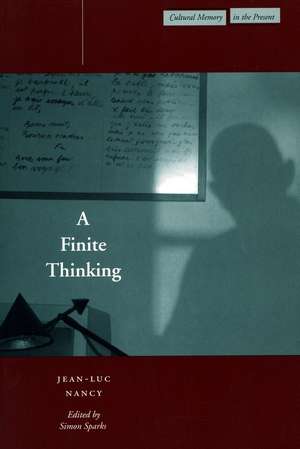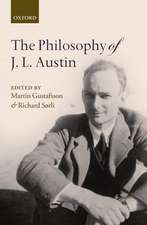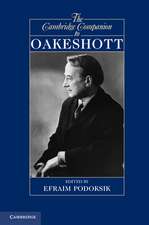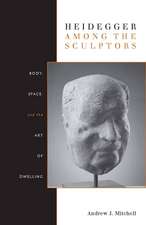A Finite Thinking: Cultural Memory in the Present
Autor Jean-Luc Nancyen Limba Engleză Paperback – 5 oct 2003
This book is a rich collection of philosophical essays radically interrogating key notions and preoccupations of the phenomenological tradition. While using Heidegger's Being and Time as its permanent point of reference and dispute, this collection also confronts other important philosophers, such as Kant, Nietzsche, and Derrida. The projects of these pivotal thinkers of finitude are relentlessly pushed to their extreme, with respect both to their unexpected horizons and to their as yet unexplored analytical potential. A Finite Thinking shows that, paradoxically, where the thought of finitude comes into its own it frees itself, not only to reaffirm a certain transformed and transformative presence, but also for a non-religious reconsideration and reaffirmation of certain theologemes, as well as of the body, heart, and love. This book shows the literary dimension of philosophical discourse, providing important enabling ideas for scholars of literature, cultural theory, and philosophy.
| Toate formatele și edițiile | Preț | Express |
|---|---|---|
| Paperback (1) | 230.37 lei 22-36 zile | |
| Stanford University Press – 5 oct 2003 | 230.37 lei 22-36 zile | |
| Hardback (1) | 779.27 lei 43-57 zile | |
| Stanford University Press – 5 oct 2003 | 779.27 lei 43-57 zile |
Din seria Cultural Memory in the Present
-
 Preț: 173.10 lei
Preț: 173.10 lei -
 Preț: 197.12 lei
Preț: 197.12 lei -
 Preț: 365.56 lei
Preț: 365.56 lei -
 Preț: 193.14 lei
Preț: 193.14 lei -
 Preț: 194.26 lei
Preț: 194.26 lei -
 Preț: 155.84 lei
Preț: 155.84 lei -
 Preț: 155.89 lei
Preț: 155.89 lei -
 Preț: 149.68 lei
Preț: 149.68 lei -
 Preț: 211.98 lei
Preț: 211.98 lei -
 Preț: 228.62 lei
Preț: 228.62 lei -
 Preț: 206.94 lei
Preț: 206.94 lei -
 Preț: 209.36 lei
Preț: 209.36 lei -
 Preț: 193.58 lei
Preț: 193.58 lei -
 Preț: 156.25 lei
Preț: 156.25 lei -
 Preț: 146.22 lei
Preț: 146.22 lei -
 Preț: 171.47 lei
Preț: 171.47 lei -
 Preț: 194.45 lei
Preț: 194.45 lei -
 Preț: 229.26 lei
Preț: 229.26 lei -
 Preț: 296.64 lei
Preț: 296.64 lei -
 Preț: 210.24 lei
Preț: 210.24 lei -
 Preț: 228.62 lei
Preț: 228.62 lei -
 Preț: 278.31 lei
Preț: 278.31 lei -
 Preț: 298.62 lei
Preț: 298.62 lei -
 Preț: 153.16 lei
Preț: 153.16 lei -
 Preț: 193.58 lei
Preț: 193.58 lei -
 Preț: 204.76 lei
Preț: 204.76 lei -
 Preț: 228.39 lei
Preț: 228.39 lei -
 Preț: 139.64 lei
Preț: 139.64 lei -
 Preț: 243.46 lei
Preț: 243.46 lei -
 Preț: 201.90 lei
Preț: 201.90 lei -
 Preț: 152.36 lei
Preț: 152.36 lei -
 Preț: 226.40 lei
Preț: 226.40 lei -
 Preț: 169.59 lei
Preț: 169.59 lei -
 Preț: 197.12 lei
Preț: 197.12 lei -
 Preț: 194.88 lei
Preț: 194.88 lei -
 Preț: 170.65 lei
Preț: 170.65 lei -
 Preț: 194.45 lei
Preț: 194.45 lei -
 Preț: 151.12 lei
Preț: 151.12 lei -
 Preț: 194.01 lei
Preț: 194.01 lei -
 Preț: 194.45 lei
Preț: 194.45 lei -
 Preț: 208.06 lei
Preț: 208.06 lei -
 Preț: 196.69 lei
Preț: 196.69 lei -
 Preț: 142.73 lei
Preț: 142.73 lei -
 Preț: 466.13 lei
Preț: 466.13 lei -
 Preț: 167.15 lei
Preț: 167.15 lei -
 Preț: 194.45 lei
Preț: 194.45 lei -
 Preț: 173.51 lei
Preț: 173.51 lei -
 Preț: 232.11 lei
Preț: 232.11 lei -
 Preț: 207.13 lei
Preț: 207.13 lei -
 Preț: 150.09 lei
Preț: 150.09 lei
Preț: 230.37 lei
Nou
Puncte Express: 346
Preț estimativ în valută:
44.09€ • 45.75$ • 36.85£
44.09€ • 45.75$ • 36.85£
Carte disponibilă
Livrare economică 24 februarie-10 martie
Preluare comenzi: 021 569.72.76
Specificații
ISBN-13: 9780804739016
ISBN-10: 0804739013
Pagini: 360
Dimensiuni: 152 x 229 x 18 mm
Greutate: 0.49 kg
Ediția:1
Editura: Stanford University Press
Colecția Stanford University Press
Seria Cultural Memory in the Present
ISBN-10: 0804739013
Pagini: 360
Dimensiuni: 152 x 229 x 18 mm
Greutate: 0.49 kg
Ediția:1
Editura: Stanford University Press
Colecția Stanford University Press
Seria Cultural Memory in the Present
Recenzii
"This book is a splendid demonstration of the many joys of thinking about thought itself. The finitude highlighted in the title applies to the concepts of thinking that Nancy expertly and adroitly elucidates: sense, sacrifice, existence, presence, love, the body. Nancy shows us that thinking is not a chess game of large, ungainly abstract pieces; it is a dance of specificity much akin to poetry and art themselves." —Henry Sussman,State University of New York at Buffalo
Notă biografică
Jean-Luc Nancy is Professor of Philosophy at the University of Strasbourg. Stanford has published five of his books: The Speculative Remark (2001), Being Singular Plural (2000), The Muses (1996), The Birth to Presence (1993), and The Experience of Freedom (1993).
Textul de pe ultima copertă
“This book is a splendid demonstration of the many joys of thinking about thought itself. The finitude highlighted in the title applies to the concepts of thinking that Nancy expertly and adroitly elucidates: sense, sacrifice, existence, presence, love, the body. Nancy shows us that thinking is not a chess game of large, ungainly abstract pieces; it is a dance of specificity much akin to poetry and art themselves.” —Henry Sussman,State University of New York at Buffalo















